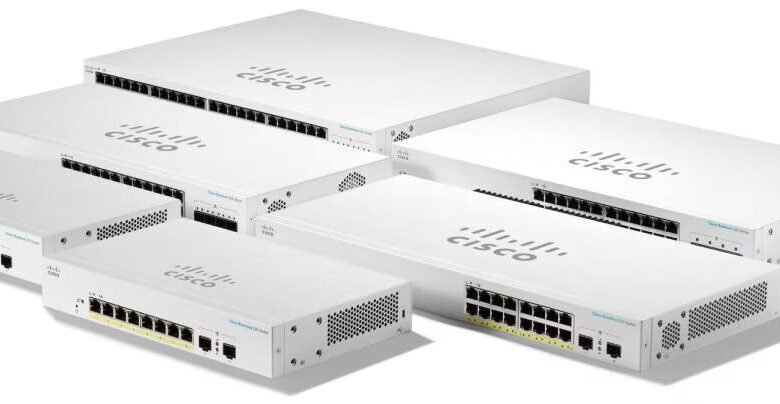
In the ever-evolving world of IT hardware and networking, the importance of having a reliable, high-performance network cannot be overstated. One essential component of modern networks is the Cisco Smart Switch. Known for its reliability and advanced functionality, the Cisco Smart Switch is designed to provide businesses with scalable and efficient networking solutions. Whether it’s for small to medium-sized businesses or larger enterprises, these switches offer the perfect blend of performance, security, and simplicity. In this post, we will explore what makes Cisco Smart Switches stand out in the world of computer hardware, how they work, and their importance in modern technology infrastructures.
What is a Cisco Smart Switch?
A Cisco Smart Switch is a type of managed network switch that gives users control over various network settings, while still being easy to use. Unlike unmanaged switches, which simply pass traffic between connected devices, smart switches allow for limited configuration and monitoring of the network. This flexibility is essential in ensuring that businesses can manage their network traffic efficiently, without the complexity or cost of fully managed switches.
Cisco Smart Switches offer a perfect middle ground between unmanaged and fully managed switches, providing key features such as VLAN (Virtual Local Area Network) support, Quality of Service (QoS) settings, and security features like access control lists (ACLs). These features make them ideal for small to medium-sized businesses that need more control and security but do not have the budget or resources for complex networking setups.
How Do Cisco Smart Switches Work?
At their core, Cisco Smart Switches work by directing data traffic between different devices on a network. Whether it’s between computers, printers, servers, or other networked devices, the switch ensures that the data packets reach their intended destination efficiently. Cisco Smart Switches are equipped with advanced technology that helps optimize network traffic and ensures smooth communication between devices.
1. Traffic Management
Cisco Smart Switches use VLAN technology to segment network traffic. This allows businesses to divide their network into smaller, more manageable sections. By creating different VLANs, businesses can separate internal traffic (such as between employees) from external traffic (such as guest Wi-Fi), improving security and reducing network congestion.
Another key feature is Quality of Service (QoS), which prioritizes certain types of network traffic over others. For example, in a business setting, voice traffic (VoIP) can be given higher priority than email traffic to ensure that phone calls remain clear and uninterrupted. Cisco Smart Switch allow users to set these priorities, ensuring that critical network functions receive the bandwidth they need to function optimally.
2. Security Features
In today’s digital landscape, network security is a top concern for businesses of all sizes. Cisco Smart Switches come equipped with a range of security features designed to protect the network from unauthorized access and other threats. One of the most important features is Access Control Lists (ACLs), which allow administrators to define which devices can access specific parts of the network.
Additionally, Cisco Smart Switches support features like port security, which prevents unauthorized devices from connecting to the network, and DHCP snooping, which protects against certain types of attacks by verifying the source of IP addresses.
The Benefits of Cisco Smart Switches in Modern Networks
Cisco Smart Switches offer several benefits that make them a valuable asset in any business’s Technology infrastructure. Here’s why they stand out in the realm of IT hardware:
1. Scalability
One of the primary advantages of using Cisco Smart Switches is their scalability. Businesses that are expanding can easily add new devices to their network without having to overhaul their existing infrastructure. Cisco Smart Switches come in various models that support different port counts and configurations, making it easy for businesses to scale up as they grow.
For example, a small business may start with a basic 8-port Cisco Smart Switch, but as it expands and requires more network capacity, it can seamlessly upgrade to a 24-port or 48-port model. The switches are designed to be interoperable, allowing businesses to build a network that grows with them.
2. Cost-Effective Networking Solutions
Cisco Smart Switches provide many of the features of fully managed switches but at a lower cost, making them an excellent solution for businesses on a budget. Instead of investing in an expensive managed switch, which requires significant IT expertise to configure and maintain, businesses can take advantage of the streamlined configuration process and lower cost of a smart switch.
This balance between functionality and affordability is particularly beneficial for small and medium-sized businesses that need advanced networking features but may not have the resources to manage a complex network.
3. Ease of Use and Configuration
While Cisco Smart Switches offer advanced features, they are designed with ease of use in mind. Many of the features can be configured using a web-based interface, making it simple for IT administrators to set up the switch without needing extensive command-line experience. This intuitive setup process reduces the time and effort required to get the network up and running.
Cisco also offers extensive documentation and support, which can help businesses quickly troubleshoot any issues that arise and optimize their switch settings for specific needs.
4. Improved Network Performance
In business environments where multiple devices are connected to the network at all times, maintaining high performance can be a challenge. Cisco Smart Switches offer Layer 2 and Layer 3 capabilities, which ensure efficient routing and switching of traffic between devices. By segmenting traffic and optimizing bandwidth usage, Cisco Smart Switches help businesses maintain smooth network operations, even under heavy workloads.
For businesses relying on video conferencing, VoIP, cloud-based applications, and other bandwidth-intensive services, having a smart switch in place ensures that the network remains reliable and responsive.
Applications of Cisco Smart Switches in Different Industries
Cisco Smart Switches are versatile and can be applied in various industries, making them suitable for a wide range of Networking environments. Here are some examples of how different sectors can benefit from Cisco Smart Switches:
1. Small and Medium Businesses (SMBs)
For small and medium-sized businesses, Cisco Smart Switches offer a practical solution for managing IT hardware. Whether a business operates out of a single office or has multiple branches, Cisco Smart Switches allow easy management and secure, reliable communication between devices. SMBs can use VLANs to separate guest and employee networks, ensuring that their internal systems remain secure while offering visitors internet access.
2. Education
Schools and universities often have complex networks that include multiple devices, from student and faculty computers to printers and servers. Cisco Smart Switches allow educational institutions to segment traffic between different departments, prioritize critical services like online testing and research, and secure their networks from outside interference.
3. Healthcare
In healthcare, data security is of utmost importance, and Cisco Smart Switches provide the necessary tools to protect sensitive patient information. By segmenting traffic between different departments—such as administrative, clinical, and public networks—healthcare organizations can ensure compliance with data protection regulations like HIPAA while maintaining efficient network performance.
4. Retail
Retail businesses often rely on point-of-sale (POS) systems, inventory management software, and other networked devices to run their operations smoothly. Cisco Smart Switches ensure that these critical systems remain online and prioritize their network traffic over less important services, reducing the risk of downtime during peak business hours.
Conclusion:
As technology continues to advance, businesses of all sizes need reliable and secure network solutions to maintain their competitive edge. Cisco Smart Switches offer an ideal balance of performance, security, and ease of use, making them a valuable asset for any business looking to enhance its IT hardware infrastructure.
With advanced features like VLANs, QoS, and port security, Cisco Smart Switches provide the flexibility and control that businesses need to manage their networks effectively. Moreover, their scalability and affordability make them accessible to small and medium-sized businesses while still providing the performance and reliability required by larger enterprises.
By investing in Cisco Smart Switches, businesses can ensure that their networks are prepared for the demands of today’s digital landscape, offering a scalable and secure solution that enhances overall productivity and connectivity.



